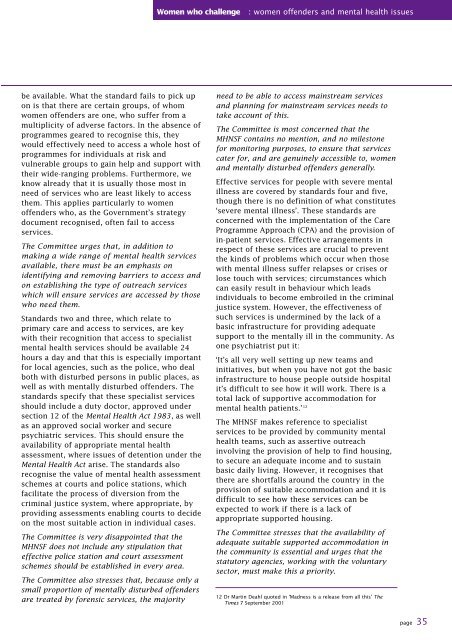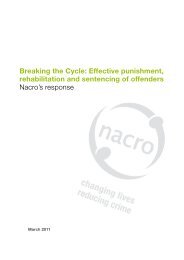Women who challenge - Nacro
Women who challenge - Nacro
Women who challenge - Nacro
- No tags were found...
Create successful ePaper yourself
Turn your PDF publications into a flip-book with our unique Google optimized e-Paper software.
<strong>Women</strong> <strong>who</strong> <strong>challenge</strong>: women offenders and mental health issuesbe available. What the standard fails to pick upon is that there are certain groups, of <strong>who</strong>mwomen offenders are one, <strong>who</strong> suffer from amultiplicity of adverse factors. In the absence ofprogrammes geared to recognise this, theywould effectively need to access a <strong>who</strong>le host ofprogrammes for individuals at risk andvulnerable groups to gain help and support withtheir wide-ranging problems. Furthermore, weknow already that it is usually those most inneed of services <strong>who</strong> are least likely to accessthem. This applies particularly to womenoffenders <strong>who</strong>, as the Government’s strategydocument recognised, often fail to accessservices.The Committee urges that, in addition tomaking a wide range of mental health serv i c e savailable, there must be an emphasis onidentifying and removing barriers to access andon establishing the type of outreach serv i c e swhich will ensure services are accessed by those<strong>who</strong> need them.Standards two and three, which relate toprimary care and access to services, are keywith their recognition that access to specialistmental health services should be available 24hours a day and that this is especially importantfor local agencies, such as the police, <strong>who</strong> dealboth with disturbed persons in public places, aswell as with mentally disturbed offenders. Thestandards specify that these specialist servicesshould include a duty doctor, approved undersection 12 of the Mental Health Act 1983, as wellas an approved social worker and securepsychiatric services. This should ensure theavailability of appropriate mental healthassessment, where issues of detention under theMental Health Act arise. The standards alsorecognise the value of mental health assessmentschemes at courts and police stations, whichfacilitate the process of diversion from thecriminal justice system, where appropriate, byproviding assessments enabling courts to decideon the most suitable action in individual cases.The Committee is very disappointed that theMHNSF does not include any stipulation thateffective police station and court assessmentschemes should be established in every area.The Committee also stresses that, because only asmall proportion of mentally disturbed offendersare treated by forensic services, the majorityneed to be able to access mainstream servicesand planning for mainstream services needs totake account of this.The Committee is most concerned that theMHNSF contains no mention, and no milestonefor monitoring purposes, to ensure that servicescater for, and are genuinely accessible to, womenand mentally disturbed offenders generally.Effective services for people with severe mentalillness are covered by standards four and five,though there is no definition of what constitutes‘severe mental illness’. These standards areconcerned with the implementation of the CareProgramme Approach (CPA) and the provision ofin-patient services. Effective arrangements inrespect of these services are crucial to preventthe kinds of problems which occur when thosewith mental illness suffer relapses or crises orlose touch with services; circumstances whichcan easily result in behaviour which leadsindividuals to become embroiled in the criminaljustice system. However, the effectiveness ofsuch services is undermined by the lack of abasic infrastructure for providing adequatesupport to the mentally ill in the community. Asone psychiatrist put it:‘It’s all very well setting up new teams andinitiatives, but when you have not got the basicinfrastructure to house people outside hospitalit’s difficult to see how it will work. There is atotal lack of supportive accommodation formental health patients.’ 12The MHNSF makes reference to specialistservices to be provided by community mentalhealth teams, such as assertive outreachinvolving the provision of help to find housing,to secure an adequate income and to sustainbasic daily living. However, it recognises thatthere are shortfalls around the country in theprovision of suitable accommodation and it isdifficult to see how these services can beexpected to work if there is a lack ofappropriate supported housing.The Committee stresses that the availability ofadequate suitable supported accommodation inthe community is essential and urges that thestatutory agencies, working with the voluntarysector, must make this a priority.12 Dr Martin Deahl quoted in ‘Madness is a release from all this’ TheTimes 7 September 2001page 35
















